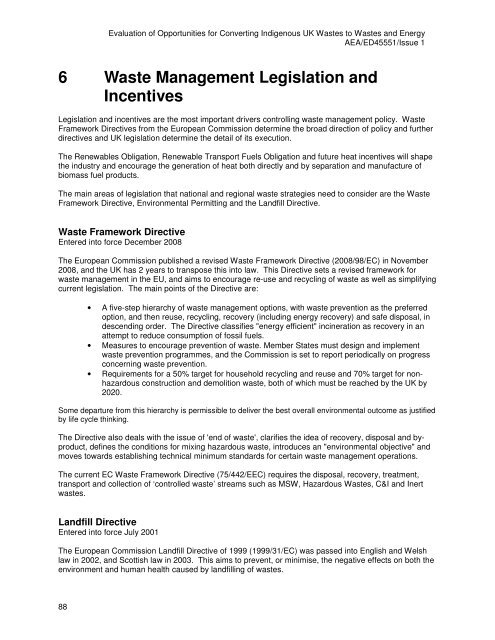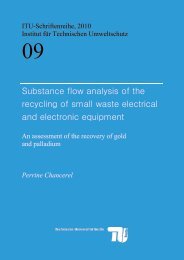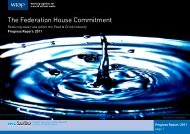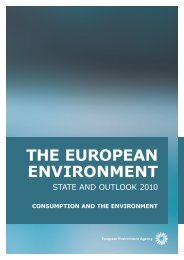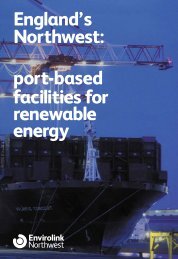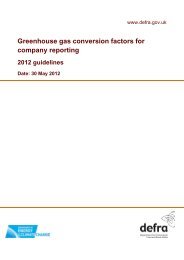to read the full report - Ecolateral by Peter Jones
to read the full report - Ecolateral by Peter Jones
to read the full report - Ecolateral by Peter Jones
You also want an ePaper? Increase the reach of your titles
YUMPU automatically turns print PDFs into web optimized ePapers that Google loves.
88<br />
Evaluation of Opportunities for Converting Indigenous UK Wastes <strong>to</strong> Wastes and Energy<br />
AEA/ED45551/Issue 1<br />
6 Waste Management Legislation and<br />
Incentives<br />
Legislation and incentives are <strong>the</strong> most important drivers controlling waste management policy. Waste<br />
Framework Directives from <strong>the</strong> European Commission determine <strong>the</strong> broad direction of policy and fur<strong>the</strong>r<br />
directives and UK legislation determine <strong>the</strong> detail of its execution.<br />
The Renewables Obligation, Renewable Transport Fuels Obligation and future heat incentives will shape<br />
<strong>the</strong> industry and encourage <strong>the</strong> generation of heat both directly and <strong>by</strong> separation and manufacture of<br />
biomass fuel products.<br />
The main areas of legislation that national and regional waste strategies need <strong>to</strong> consider are <strong>the</strong> Waste<br />
Framework Directive, Environmental Permitting and <strong>the</strong> Landfill Directive.<br />
Waste Framework Directive<br />
Entered in<strong>to</strong> force December 2008<br />
The European Commission published a revised Waste Framework Directive (2008/98/EC) in November<br />
2008, and <strong>the</strong> UK has 2 years <strong>to</strong> transpose this in<strong>to</strong> law. This Directive sets a revised framework for<br />
waste management in <strong>the</strong> EU, and aims <strong>to</strong> encourage re-use and recycling of waste as well as simplifying<br />
current legislation. The main points of <strong>the</strong> Directive are:<br />
• A five-step hierarchy of waste management options, with waste prevention as <strong>the</strong> preferred<br />
option, and <strong>the</strong>n reuse, recycling, recovery (including energy recovery) and safe disposal, in<br />
descending order. The Directive classifies "energy efficient" incineration as recovery in an<br />
attempt <strong>to</strong> reduce consumption of fossil fuels.<br />
• Measures <strong>to</strong> encourage prevention of waste. Member States must design and implement<br />
waste prevention programmes, and <strong>the</strong> Commission is set <strong>to</strong> <strong>report</strong> periodically on progress<br />
concerning waste prevention.<br />
• Requirements for a 50% target for household recycling and reuse and 70% target for nonhazardous<br />
construction and demolition waste, both of which must be reached <strong>by</strong> <strong>the</strong> UK <strong>by</strong><br />
2020.<br />
Some departure from this hierarchy is permissible <strong>to</strong> deliver <strong>the</strong> best overall environmental outcome as justified<br />
<strong>by</strong> life cycle thinking.<br />
The Directive also deals with <strong>the</strong> issue of 'end of waste', clarifies <strong>the</strong> idea of recovery, disposal and <strong>by</strong>product,<br />
defines <strong>the</strong> conditions for mixing hazardous waste, introduces an "environmental objective" and<br />
moves <strong>to</strong>wards establishing technical minimum standards for certain waste management operations.<br />
The current EC Waste Framework Directive (75/442/EEC) requires <strong>the</strong> disposal, recovery, treatment,<br />
transport and collection of ‘controlled waste’ streams such as MSW, Hazardous Wastes, C&I and Inert<br />
wastes.<br />
Landfill Directive<br />
Entered in<strong>to</strong> force July 2001<br />
The European Commission Landfill Directive of 1999 (1999/31/EC) was passed in<strong>to</strong> English and Welsh<br />
law in 2002, and Scottish law in 2003. This aims <strong>to</strong> prevent, or minimise, <strong>the</strong> negative effects on both <strong>the</strong><br />
environment and human health caused <strong>by</strong> landfilling of wastes.


